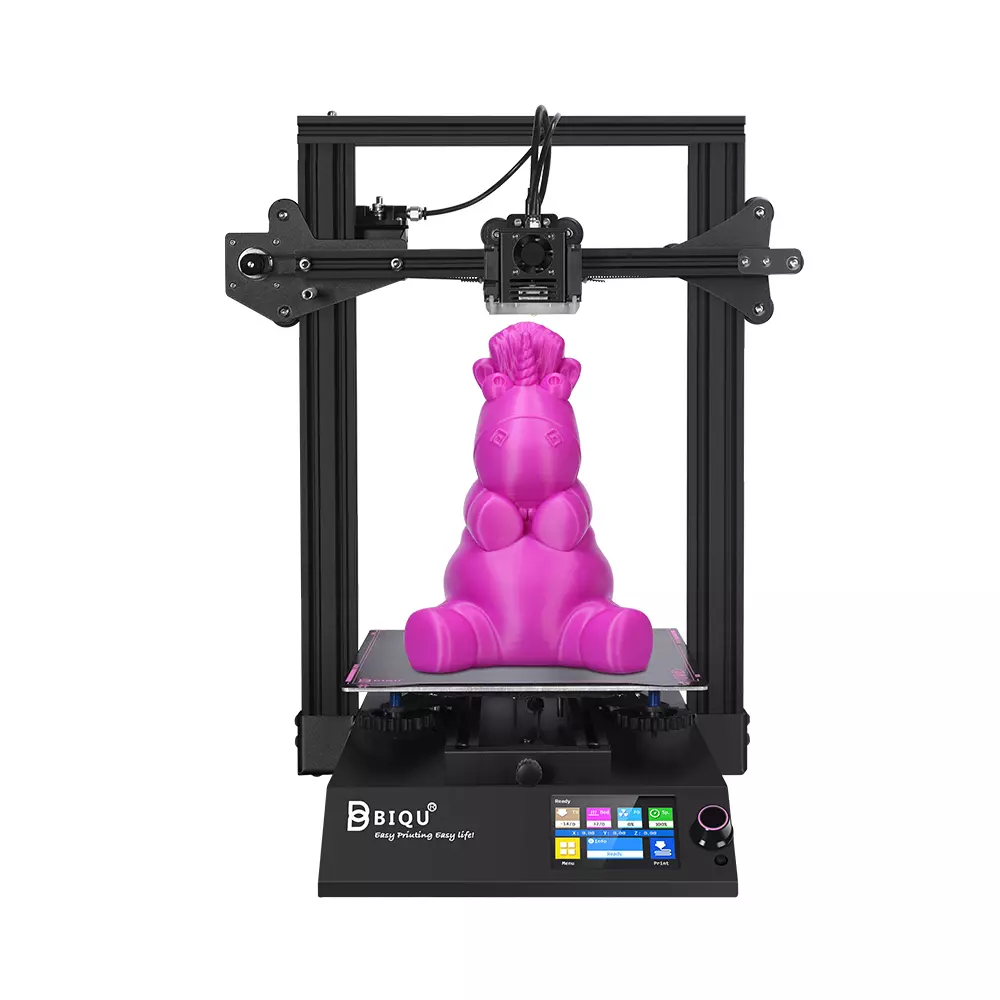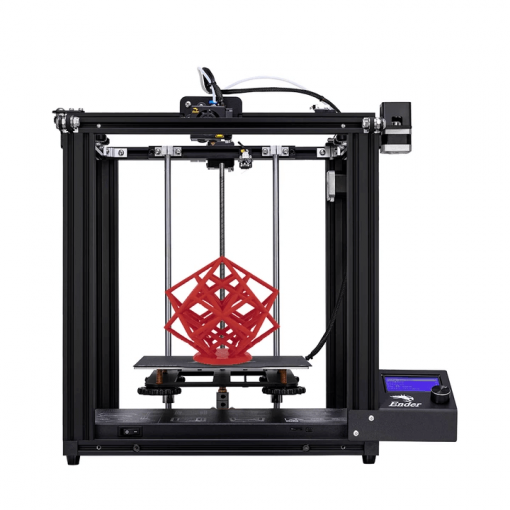Compare BIQU B1 vs Ender 5
Comparison between the best 3D printers
Choose the best 3D printer at the best price. The cheapest 3D printers are here.
Buy a 3D printer here with 3D Fila.
 |
 |
|
| Model | BIQU B1 |
Ender 5[BUY Ender 5] |
| Printing Material | Filament | Filament |
| Buy Filament for BigTreeTech BIQU B1 | Buy Filament forCreality 3D Ender 5 | |
| Estimated price | $269,00 | $399,00 |
| Manufacturer | BigTreeTech | Creality 3D |
| Release Year | 2020 | 2020 |
| Print Volume [mm] | 235x235x270 | 220x220x300 |
| Printer Size [mm] | 412x402x492 | 485x510x552 |
| Weight [kg] | 8,00 | 11,8 |
| Power Loss Recovery | YES | YES |
| Enclosed printer | NO | NO |
| Bed Leveling | Manual | Manual |
| Filament End Sensor | YES | NO |
| Bed type | Heated | Heated |
| Power supply system | Bowden | Bowden |
| Standard nozzle | 0,4 | 0,4 |
| Maximum Nozzle Temperature [°C] | 250 | 255 |
| Maximum Bed Temperature [°C] | 100 | 100 |
| Maximum printing speed [mm/s] | 100 | 180 |
| Filament holder | YES | YES |
| Camera for supervision | NO | NO |
| Recommended filaments | PLA, TPU, ABS, PETG | PLA, TPU, ABS, PETG |
| Recommended slicers | Cura, Simplify, Slic3r | Cura, Simplify, Slic3r |
| Maximum Resolution [mm] | 0,1 | 0,1 |
| Processor | 32 Bits BTT SKR V 1.4 | 32 bits |
| Display | Touchscreen TFT 3,5'' | Mono |
| Power Supply | 24V / 360W | 24V / 360W |
| Connectivity | SD / USB | SD / USB |
| Operating systems | Windows, Mac, Linux | Windows, Mac, Linux |
| Date of registration in the system | 2021-04-14 | 2021-04-15 |
| Release date | 2020 | 2020 |
| Extra features | The BIQU B1 is an advanced 3D printer with a silent 32-bit BTT SKR V1.4 motherboard and ARM Cortex-M3 CPU, offering DIY interfaces (I2C, SPI, WiFi) and dual Z-axis. Its dual BTT B1 TFT35 V3.0 operating system allows real-time monitoring and multiple printing modes, including G-code visualization effects. It stands out for its BIQU SSS (Super Spring Steel), ensuring easy model adhesion and simplified removal, with the possibility of using it on both sides. It includes a filament sensor, automatically pausing printing in case of filament breakage. The multicolored RGB lights integrated into the hotend allow you to view the printing status even at night. Additional notes include the need for a BIQU-specific Type-C cable and extra interfaces for smart filament sensor and BL Touch. | Crealitys Ender 5 stands out with a solid frame and a larger 220 x 220 x 300mm print volume. Its assembly is simple and quick, offering high print quality and speeds of up to 80mm/s. With a magnetic bed, it makes it easy to remove prints. Notable for being hackable and expandable, the Ender 5 continues Crealitys innovative tradition in the affordable 3D printer market. Equipped with a 350W/24V Meanwell power supply, it heats up quickly, in addition to having efficient cable management and modified Marlin firmware. Its unique design includes dedicated stepper motors for each axis and smooth movement on the Y axis, providing more consistent and detailed prints. |
| Support for multiple colors and materials (AMS and CFS) | NO | NO |
Notes * |
||
| Cost-benefit | 7 / 10 | 7 / 10 |
| Hardware | 2 / 10 | 1.5 / 10 |
| Tela | . | . |
| Print volume | 3 / 10 | 3 / 10 |
| Performance | 1 / 10 | 1 / 10 |
| [BUY Ender 5] |
Conclusion |
| In comparing the BIQU B1 and the Ender 5, both 3D printers share several similarities, including their release year, bed type, and maximum bed temperature. However, they also have distinct differences that may influence a buyer's decision based on their specific needs and budget. The BIQU B1 comes at a lower price point, offering features like a filament end sensor, dual Z-axis, and a more advanced motherboard, which may appeal to tech-savvy users looking for enhanced functionality and ease of use. This printer's superior print volume also provides an advantage for larger projects. Additionally, the BIQU B1 features a unique bed surface that improves adhesion, streamlining the process of removing completed prints. On the other hand, the Ender 5, though priced higher, boasts a robust build and a slightly larger print height, making it ideal for creators who prioritize structural integrity in their prints. Its ease of assembly and established reputation in the 3D printing community may attract users looking for reliability in an expandable system. The printer's modified firmware and dedicated movement mechanics promise consistent quality, making it a solid choice for hobbyists and professionals alike. Ultimately, the choice between the BIQU B1 and the Ender 5 comes down to the buyer's specific needs. If cost-effectiveness and advanced features are prioritized, the BIQU B1 represents a compelling option. Conversely, if a buyer values build quality and community trust, the Ender 5 may justify its higher price tag. Each printer offers unique benefits, making either a worthy investment depending on individual preferences and project requirements. |

